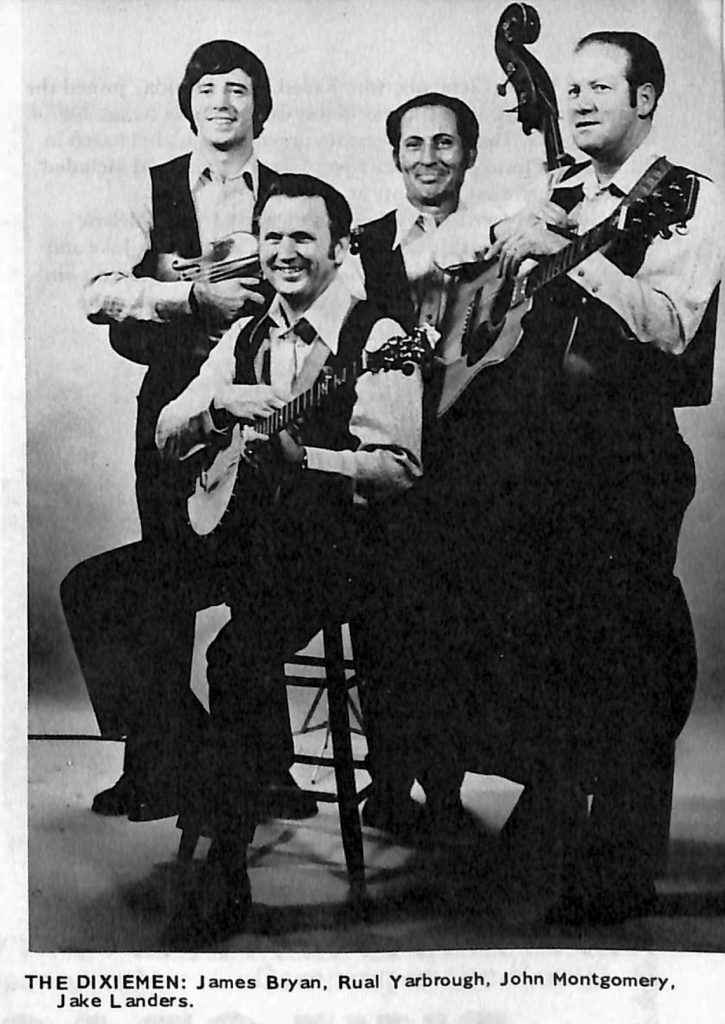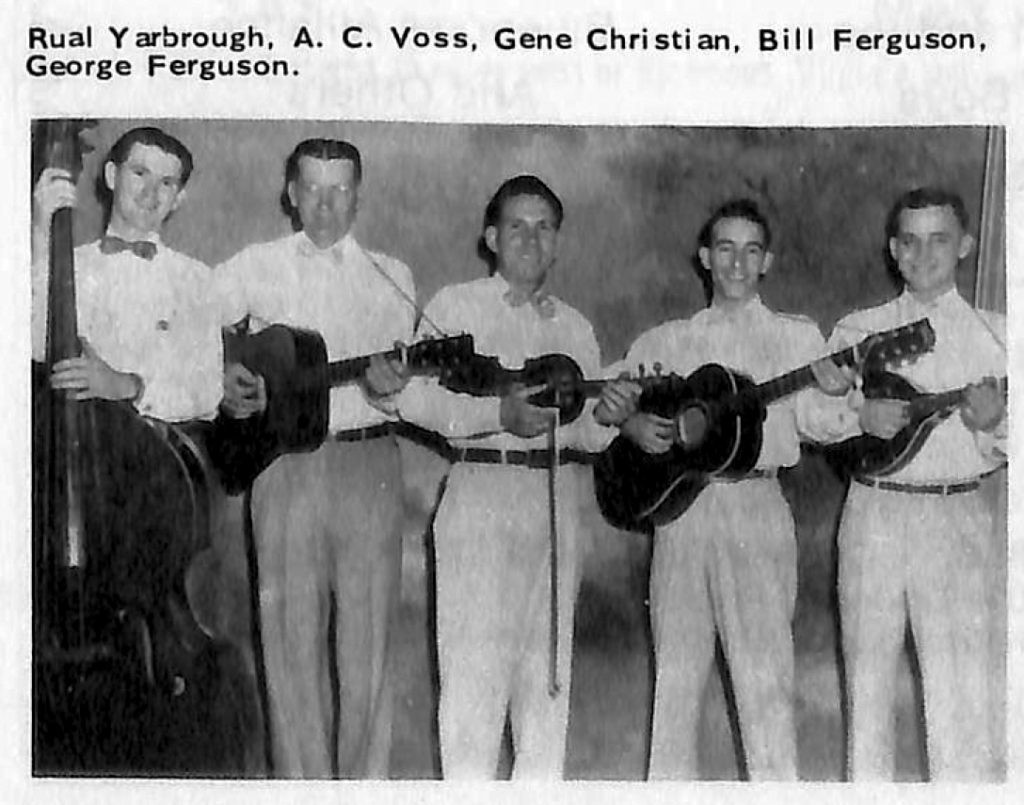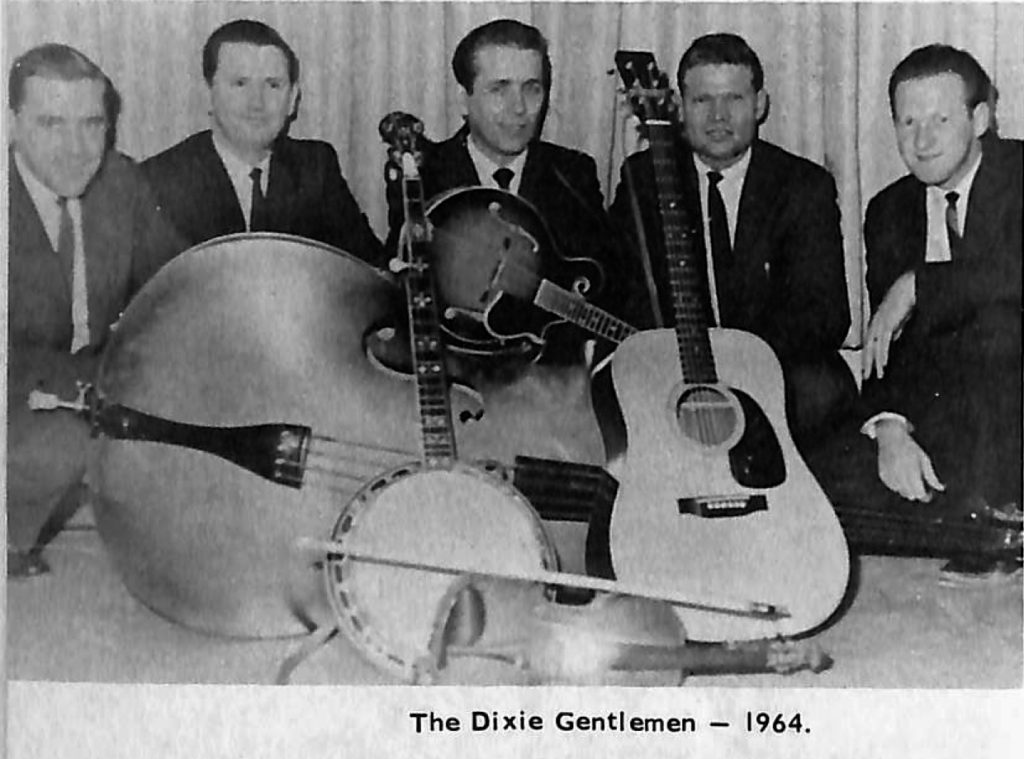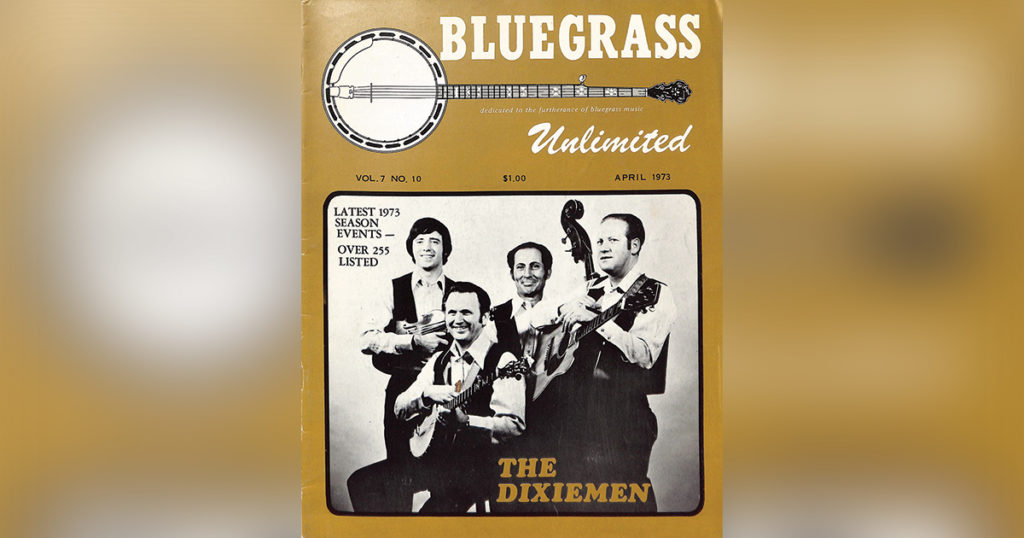Home > Articles > The Archives > Rual Yarbrough and the Dixiemen
Rual Yarbrough and the Dixiemen
Reprinted from Bluegrass Unlimited Magazine
April 1973, Volume 7, Number 10
Rual Yarbrough and the Dixiemen have had a long and very successful career. The group has included some of the finest musicians and undoubtly some of the nicest people in bluegrass music today.
Rual Yarbrough was born Jan. 13, 1930 in Lawrence County (south of Lawrenceburg), Tennessee to Ottis and Myrtle (Guthrie) Yarbrough. Though Rual did not come from a musical family he was raised in a part of the country where mountain music was loved and understood. As a young boy he enjoyed listening to such people as Bill Monroe on the Opry and admired their ability to take the old songs and make them sound so new.
At the age of 12, Rual borrowed a guitar from his uncle and soon had mastered the instrument. He went on to learn the mandolin, later the fiddle, and then the bass fiddle. It was while playing the bass in 1955 that he worked with a group known as Gene Christian and The Hillbilly Pals. Gene was a fiddler who had once worked with Bill Monroe and The Blue Grass Boys but had left to form his own group as so many others have done. Not having a banjo in the group, Gene mentioned to Rual that he missed Rudy’s (Lyle) banjo and asked Rual if he could pick up a banjo and learn to play it. Rual decided to do just that and traded his bass for a banjo and soon started playing it with the group. However, Rual recalls he was not proficient and the rest of the group carried him.

Rual moved to Alabama in 1956 where he met Hershel Sizemore, a fine mandolin player. They got together occasionally and jammed but weren’t serious about playing until Jacob (Jake) Landers, who played guitar joined. In 1958 they formed their original group. They worked local radio and later got their own television program on a local station.
Until the start of the television program they did not have a name for the group so the T.V. station manager decided to call them the Country Gentlemen. No one realized there was already a group from Washington D.C. with the same name. Later one of their fans came up to them and said he had heard their record on the radio. Knowing they had not yet cut a record, they checked further and found out about the other group. By this time they had a pretty good following and realizing it could be rather confusing if they changed their name too drastically, they decided to only change one word and call themselves the Dixie Gentlemen. Rual comments that many people down in their neck of the woods still refer to them as the Country Gentlemen.
Later Vassar Clements, who hailed from Florida, joined the group forming a very successful union which was to last for several years. They made their first record on a label based in St. Cloud, Florida. Both sides were sacred songs and included Jake Landers’ first attempts at song writing.
Pray for Me written by Jake and a good friend, Melvin Hallmark was one side and Three Steps, written by Jake and Hershel Sizemore was the second song. Al Lester played twin fiddles with Vassar and Wesley Stevens played bass on the session.
They met a man by the name of Kelso Herston who was so impressed by their music that he recommended them to Tommy Jackson, a fiddler who was looking for bluegrass musicians to help him cut an album for Dot Records. In 1960 the Dixie Gentlemen helped Tommy cut Greatest Bluegrass Hits.
Kelso Herston also recommended them to Time Records who were looking for new talent. Shortly thereafter they cut their own first album Hootnanny ‘N Bluegrass and later another called Bluegrass Back Home. These albums are no longer available but cheaper pressings have been seen in discount stores.

This was happening at a time when there was a boom in bluegrass music as a part of the “hootnanny” folk music craze. Several of the major labels were looking for talent and as a result The Dixie Gentlemen had an opportunity to sign with several companies including Dot, Mercury, and United Artists. After considering all, and upon the suggestion of Tommy Jackson, they signed a recording contract with United Artists.
In 1963, they recorded their United Artists album The Country Style of the Dixie Gentlemen. A majority of the songs were written by the group. Rual recalls there was a full rhythm section of the session including drums and piano, a new experience for the Dixie Gentlemen.
As a result of the success of the United Artists album the Hubert Long Agency wanted to book them regularly. This became quite a decision since they would have to quit their regular jobs and be available to go on the road full time. After much discussion the group decided not to go on the road at that time.
For a period of time the group went in various directions. Jake got out of music all together and Rual entered a span of playing as side man for other bands such as Jimmy Martin, Lester Flatt (during Earl Scruggs’ stay in the hospital), and Jim and Jesse. Rual also worked for quite a while with Bobby Smith and The Boys from Shiloh and helped them on several recordings for the Tune label.
It was while Rual was with Bobby Smith in 1969 that Kenny Baker arranged for Rual to once again join the Blue Grass Boys. (Both Rual and Jake had worked with Bill Monroe a short time earlier.) Rual worked with Bill for about two years helping to record some twenty one songs on Decca.
Rual worked with Bill until he and Jake decided to get back together and re-form their own group. He gave Bill notice in November of 1970 but stayed until February 1971 to work some dates that had already been booked. Rual and Bill parted on the best of terms and are still close friends.
Rual and Jake met James Joiner, (author of “A Fallen Star”), who owned the Tune Record Company. They were asked to go to Concord, Arkansas and help Tut Taylor cut an album for Tune Records at Wayne Raney’s studio. They later recorded several albums for Tune themselves using the same type of material and musicians as they had used before as the Dixie Gentlemen. However, since Hershel and Vassar was no longer working with them full time, they decided to change their name to The Dixiemen.
Rual now lives in Muscle Shoals, Alabama with his wife Mary, two daughters (Kathy and Janet), and two sons (Steve and Bruce). He owns his own music store specializing in bluegrass records and instruments.
Jacob (Jake) Landers was born August 14, 1938 in Lawrence County, Alabama in a small town called Town Creek. He moved to Leighton, Alabama at age six and entered the school system there.

Jake came from a musical family with several members playing the guitar and his grandfather playing frailing style banjo. He remembers also listening to the Grand Ole Opry as a small boy but was not as impressed with the traditional music as much as he was the crooners of the time such as Eddy Arnold. At school he started singing himself in the first grade.
By the fourth grade he learned to play the guitar as a backup for his voice. He entertained locally during his high school years singing mostly the modem C & W songs of the era.
Jake did not become interested in bluegrass music until after he had done a stint in the Army and came back home. He played with Melvin Hallmark, a banjo player and a close friend. Although Jake had gone to school with Hershel Sizemore, they did not play any music together until the time Rual and Hershel’s guitar player quit and they asked Jake to join them. This was the beginning of their association as the Dixie Gentlemen.
Jake worked with Bill Monroe in 1962 and 1969. During the time Jake worked with Bill, Jake wrote Walk Softly on My Heart which Bill was later to record. Jake also helped Bill write Beyond the Gate, a beautiful gospel song which Jake included in a recent gospel album on Tune. Bill Monroe had also recorded the song but it has not been released. Jake has helped write songs for Lester Flatt, Red Allen, Bobby Smith, and the Country Gentlemen to name a few. The Country Gentlemen recorded The Secret of the Waterfall which is believed by many, to be Jakes best composition. Jake has over fifty songs to his credit and is considered one of the best song writers in bluegrass music today.
Jake and his wife Joann, also make Muscle Shoals, Alabama their home. They have three daughters (Phyllis, Wanda, and Karen) and a new baby boy (Allen). Jake works for a local newspaper as his full time job but has no trouble getting away for show dates.
Now playing fiddle with the Dixiemen is James Bryan who was born November 24, 1953 in Gadsden, Alabama. His father (Joseph) is an old time fiddler and taught James to play at the age of eleven. James played some in local bands while in high school but did not like bluegrass music that well until he met Kenny Baker. James would skip high school to go to Nashville and stay with Kenny who taught him much about how to play fiddle bluegrass style.
James met Rual during one of these visits with Kenny (Rual and Kenny were playing with Bill Monroe at the time) and when Jim Brock left the Dixiemen, James was asked by Rual to take Jim’s place. James has been with the Dixiemen for less than a year now but has certainly become a very important part of the sound they have today.
The Dixiemen currently record for Old Homestead Records and have one LP as well as a solo fiddle LP featuring the band and the fiddling talents of James Bryan. Jakes Landers’ voice has mellowed since the earlier days of the Dixie Gentlemen and Rual has switched from baritone (his earlier singing part) to tenor, but the group still maintains the smooth, close sound that made the original group unique. A strong, common thread which is the sound that The Dixiemen have contributed to bluegrass music.
Share this article
1 Comment
Leave a Comment Cancel Reply
This site uses Akismet to reduce spam. Learn how your comment data is processed.


Rual passed away September 21, 2010. Steven David Lampley, Rual’s step son.